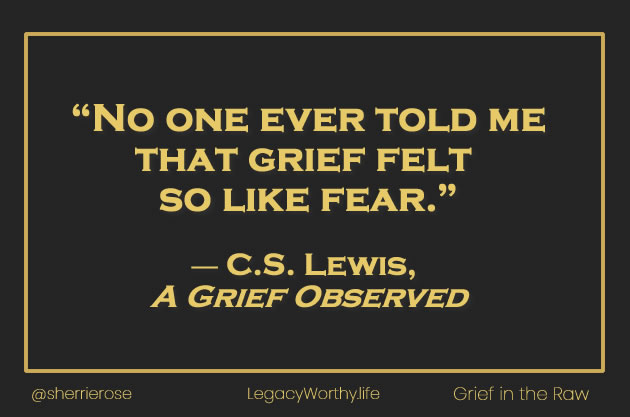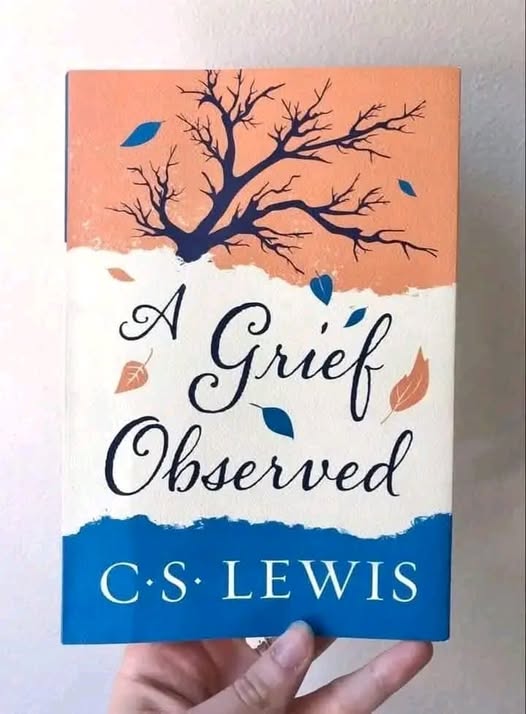Grief in the Raw: When Faith Meets the Furnace

Grief in the Raw:
When Faith Meets the Furnace
C.S. Lewis, the towering intellect renowned for his razor-sharp defense of faith, is shattered—utterly undone—by the death of his beloved wife, Joy Davidman Gresham. The man who once penned The Problem of Pain with clinical precision now stumbles through a storm of anguish in A Grief Observed, a journal that doesn’t just explore grief—it bleeds it.
The opening pages strike like a blow: the brilliant philosopher admits, with soul-piercing clarity, that the author of his earlier work had no clue what suffering truly meant. It’s as if theory collapses under the unbearable weight of reality. The difference between the two books isn’t just tone—it’s temperature. One is written in the cold light of logic; the other in the heat of heartbreak.
The book was published in 1961 under the pseudonym N.W. Clerk because Lewis wished to avoid the connection. Though republished in 1963 under his own name after his death, the text still refers to his wife as “H” (She was an American poet and writer, and their relationship began after she wrote to him as a religious guide. She was of Jewish lineage. Davidman’s death from cancer in 1960 deeply impacted Lewis, leading him to write A Grief Observed as a way to process his grief and explore his faith.)
What makes the journal of C.S. Lewis unforgettable:
- Grief doesn’t reside politely in the heart—it takes over the body.
Lewis describes awakening each morning with a stomach clenched in pain, breath caught in the fog of disbelief. His grief is physical, disorienting. Wandering the halls of his home like a man concussed by memory, he stumbles upon fragments of joy that now cut like glass. These aren’t metaphors. This is what it looks like when mourning inhabits flesh. - Faith isn’t untouched—it is assaulted.
Lewis doesn’t shield God from his rage or sorrow. He shouts into the silence. He questions everything he once believed with unflinching honesty. And in doing so, he gives others permission to wrestle without shame. Watching a spiritual giant collapse under the weight of loss reveals not weakness, but authenticity. This is not faith lost—it is faith flayed open. - Memory becomes both savior and saboteur.
The cruel paradox: the harder one tries to hold on to a face, the faster it fades. Yet her laughter, unbidden, ambushes him while stirring a cup of tea. The unreliability of memory becomes its own torment. It’s a cruel magic—what is yearned for disappears; what is least expected resurfaces and devastates. - Love doesn’t end—it evolves into ache.
Lewis realizes that grief is love with nowhere to go. The pain is not the absence of love, but its persistence. This understanding doesn’t soften the loss—but it transforms it. The wound becomes sacred because it is shaped by love’s depth. Grief, then, is not the enemy of love, but its enduring echo. - Grief redraws the entire map of existence.
Reality shifts. Time fractures. Even God feels altered, recast through the lens of sorrow. Lewis isn’t trying to return to normal—he’s trying to make sense of the new normal, one refracted through grief’s prism. And there’s honesty in that journey—staggering, painful, holy honesty.
At its heart, A Grief Observed is not a tidy reflection. It is raw, unfiltered, unfinished. It doesn’t offer closure—it offers presence. A man shattered by loss opens his journal and lets the reader sit beside him, in the echoing quiet of an empty house. There are no conclusions here, only the slow, trembling steps toward a deeper kind of faith—one not built in the safety of certainty, but in the furnace of suffering.
This isn’t just grief observed. It is grief inhabited. Grief endured. Grief transformed.

P.S. Who was C.S. Lewis?
Clive Staples Lewis (1898–1963) was a British writer, professor of literature at both Oxford and Cambridge, and one of the most influential Christian thinkers of the 20th century. Though known for his scholarly work, Lewis reached the hearts of millions through his fiction, apologetics, and reflections on suffering, joy, and faith.
Notable books by C.S. Lewis include:
- A Grief Observed (quotes from book)
- The Problem of Pain
- Mere Christianity
- The Screwtape Letters
- The Great Divorce
- Surprised by Joy
- The Four Loves
- Till We Have Faces
- Reflections on the Psalms
- Letters to Malcolm: Chiefly on Prayer
- The Abolition of Man
- The Weight of Glory
- God in the Dock
- Present Concerns
- The Pilgrim’s Regress
- Miracles
- Of Other Worlds
- An Experiment in Criticism
And of course, the beloved Chronicles of Narnia series:
- The Lion, the Witch and the Wardrobe
- Prince Caspian
- The Voyage of the Dawn Treader
- The Silver Chair
- The Horse and His Boy
- The Magician’s Nephew
- The Last Battle
The legacy of C.S. Lewis continues to shape minds and comfort souls across generations.
P.P.S.
No one is prepared for grief. Preparing your Masterwork involves more than creativity or ambition. It also requires practical legacy planning, because loss can come suddenly and leave everything in disarray. C.S. Lewis’s A Grief Observed shows how deeply grief can shake a person, even one known for intellectual and spiritual strength. When overwhelmed by sorrow, it becomes difficult to think clearly or act with purpose. By planning ahead, it becomes possible to protect and preserve what matters most, even in the midst of unexpected heartbreak. Legacy planning is not a distraction or interruption from meaningful work; legacy planning is part of the work itself.


